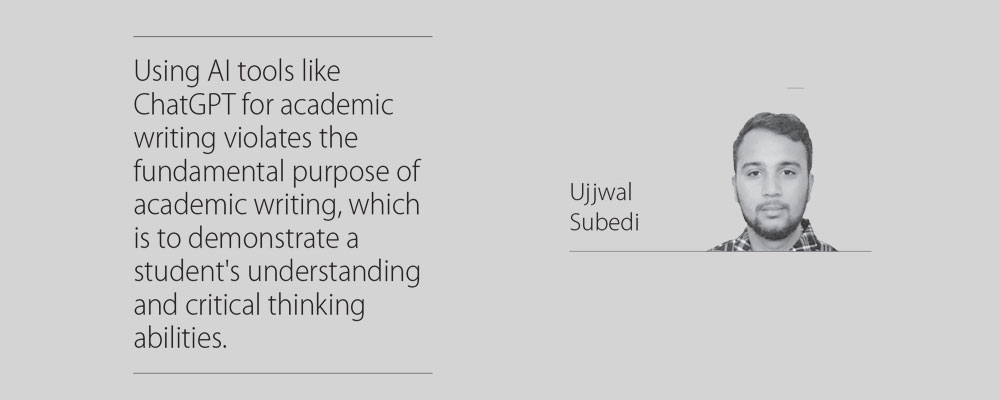- Monday, 20 May 2024
AI's Implications For Academic Writing
Plagiarism is often considered a serious offense in universities and colleges. As in international scenario, in the context of Nepal, plagiarism is taken as grave breach of law in both undergraduate and post-graduate colleges. One might be wondering what plagiarism is. The Oxford dictionary defines it as “copying of someone else's work, ideas without the consent of original author, and, accompanying it as your own”. When someone plagiarises, s/he doesn’t acknowledge the source of specific language or even of their thinking or they attribute it to somebody else like adding someone else’s name to one's paper in order perhaps to attract more readers.
With the invention of AI tools like ChatGPT, however, it is getting harder to distinguish between original ideas and plagiarism. ChatGPT is a powerful language model that can produce human-like text, making it a valuable tool for writing academic papers. So the use of AI tools in academic writing has embarked on a heated discussion among educators and students alike. This article explores the appropriateness of citing ChatGPT and other AI tools in academic papers, considering both the advantages as well as the disadvantages of their use.
Double-edged sword
After its initial release on November 30, 2022, ChatGPT has evolved as a game changer in the world of language generation. Unquestionably, the capabilities of ChatGPT are undeniable, allowing users to quickly and easily produce high-quality answers with ease. It can generate ideas, summarise information, and even support students with their thesis or research. These days, students write their thesis entirely, or many parts of thesis using ChatGPT and claim that to be on their own ideas and findings. This has raised concerns about plagiarism and academic misconduct.
Students who support the use of ChatGPT in academic papers argue that it can be a valuable tool for research and ideas. They claim that ChatGPT can assist them in filling gaps in their research, inspire them to come up with new ideas, and even help them in summarising large amounts of information.
Students may argue that ChatGPT increases productivity by speeding up the writing process, allowing them to focus more time and energy on refining their arguments and conducting in-depth research in other subject areas for their academic work. Additionally, they also argue that citing ChatGPT acknowledges the tool’s contribution to the paper and gives credit where it is due.
Teachers, on the other hand, are concerned that citing ChatGPT could lead to lack of original thought and plagiarism. They argue that the primary goal of academic writing is to showcase students’ ability and ideas on their work. Using AI tools like ChatGPT for academic writing violates the fundamental purpose of academic writing, which is to demonstrate a student's understanding and critical thinking abilities. Furthermore, they are concerned that students may utilise ChatGPT to create entire sections or even entire papers without properly citing them, which could result in loss of authenticity in academic papers.
One possible solution could be to provide students with clear guidelines on how the tools can be used responsibly. This may involve requiring students to disclose the use of the tool, and demonstrate their own understanding and critical analysis of the content generated.
Additionally, educators may need to adapt their assessment methods to better capture the depth of a student's learning, rather than solely relying on the quality of the written work.
With both arguments, it is essential to acknowledge the ability of ChatGPT as a powerful tool. It is a useful tool and if used responsibly, it can be a valuable tool for academic writing. However, it is crucial to ensure the student's understand the importance of original thought and proper citation. To use this tool responsibly, students should understand that it is a tool for research and idea generation, rather than a substitute for their own writing.
Additionally, educators can also set guidelines for the use of AI tools in academic papers, such as requiring students to properly cite Chat-GPT generated content or limiting the amount of AI-generated text in a paper.
Integrity
With the revolution of AI, the use of AI tools like ChatGPT in academic papers is a complex issue with valid arguments on both sides. Educators must navigate potential benefits of these tools with the need to maintain the integrity of academic papers. Ultimately, an appropriate framework is needed between educators and students to work together to find a balance between the benefits and shortcomings of using AI tools in academic research.
By establishing clear guidelines, fostering open dialogues and adapting our assessments process, we can ensure that appropriate use of AI in academic writing. By acknowledging the potential benefits and drawbacks of ChatGPT, we can ensure the academic integrity remains intact while still harnessing the power of AI to enhance the writing process.
(The author is a freelancer.)









-original-thumb.jpg)






